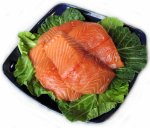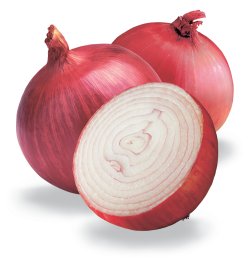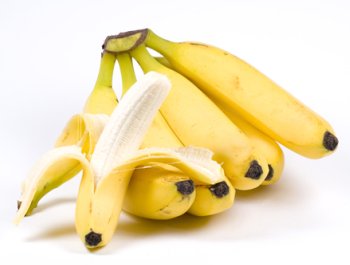The 6 Best Foods For Constipation
That You Need to Know about
(Part 2)
The 6 foods for constipation mentioned here are excellent at keeping you regular. How do they work?
- Dark Leafy Greens
- Ginger
- Honey
- Rhubarb
- Squash
- Coffee
Other foods for constipation are discussed in Part 1 and they're apples, beans, berries, flaxseed and dried fruit.
Dark Leafy Greens
A salad tossed with various dark leafy greens is a must among the foods for constipation.
Throw in a few handfuls of apple slices, raisins, blackberries, red cabbage and toasted flaxseed and you have the makings of a digestive dream.
Dark greens are a great source of omega-3's, which help keep your bowels moving beautifully.
Good greens to choose include kale, Swiss chard, endive, dandelion greens, beet greens, turnip greens, purslane, chicory and spinach. When it comes to colour, the darker the better. The deepest hues offer the biggest benefit.
Dandelion in particular is more than just a backyard weed. It's long been regarded as an effective natural laxative that increases bile flow into your large intestine, which helps prevent constipation.
Dark green leafy vegetables can do double duty on your intestine not only because of their fiber content but also because of their high magnesium content.
Magnesium is a superb laxative, but while nuts, seeds and leafy dark green vegetables are good sources of magnesium, if you're really backed up, a magnesium supplement can help (150 to 300 mg. twice daily).
Ginger

Long known for its many healing properties, ginger is a tasty way to deal with constipation.
This spice contains chemicals that stimulate your digestive system by increasing the wavelike contractions (called peristalsis) that move food through your intestines, so it's definitely worth adding it to the other foods for constipation.
Ginger is known as an excellent carminative, that is it promotes the elimination of intestinal wind, and as an intestinal spasmolytic, a substance that relaxes and soothes the intestinal tract. It also helps with digestion, so it's a very good all-round remedy for the digestive system.
There are many ways to get the health benefits of ginger, which comes in a variety of forms, including fresh, dried, crystallized, candied, pickled and powdered. Fresh is best, with crystallized coming in second.
I like to grate some fresh ginger on my breakfast of yogurt and fruit and a sprinkling of grated cinnamon, it's simply delicious!
Honey
Honey contains large amounts of fructose, a sugar that sometimes arrives in the large intestine undigested.
When bacteria in the intestine begin the process of fermentation, water is drawn into the bowel and softens your stools, which acts as a natural laxative.
Honey is higher in fructose than almost any other foods.
So, if you're constipated substitute honey for artificial sweeteners.
Even better, drizzle it over fresh berries to get double the digestive benefits.
Rhubarb
The stalks of rhubarb have long been listed among the foods for constipation.
A half cup of rhubarb stalks contains large amounts of insoluble fiber - the kind you need to keep your bowels moving regularly.
It's important to know that you should eat only the stalks because the leaves contain very high levels of toxins called oxalates that can cause stomach irritation and kidney problems.
TRY THIS:
If you need something powerful to get you going, you can try this fast constipation-relief recipe:
- Chop three stalks of fresh rhubarb, combine in a blender with 1 cup of apple juice, a quarter of peeled lemon, and 1 teaspoon of honey and puree until smooth.
- Drink as needed to get things moving. If you find this thick drink too tart, add other fruit juices or more honey.
Squash
Researchers have just begun to discover the incredible healing potential of this vegetable, particularly winter squashes such as acorn, butternut and Hubbard.
When it come to digestion, the fiber found in dark yellow and orange winter squash can be particularly helpful with constipation.
Pale summer squash, on the other hand, is lower in fiber and not as beneficial as the other foods for constipation.
Coffee
Besides, keeping you on schedule, a cup of coffee in the morning can keep you regular, too.
Some researchers believe that is the the caffeine in coffee that signals your large intestine to contract.
But that doesn't seem to be the case, as both caffeinated and decaffeinated coffee promote bowel movements in about 1/3 of the healthy population, says Dr. Nicholas Read, director of the Centre of Human Nutrition at the University of Sheffield.
It seems that this happens only to certain "coffee responders". In these people, coffee has an amazingly fast effect.
In a study, contraction in the bowel were detected within just four minutes after drinking coffee. This suggests, Dr. Read says, that coffee somehow sends an advance message to the colon via hormones in the stomach or some neurological mechanism.
There's no way the coffee could reach the colon so fast, he says. The increased motility lasted for at least half an hour.
Coffee seems more likely to have a laxative effect in women than in men, Dr. Read found. He also suspects it works best in the morning and perhaps not at all later in the day.
In another study, scientists in Japan found that women who drank the most coffee were less likely to be constipated than women who drank the least.
However, drinking too much coffee removes more fluids from your body than it puts in and, when used addictively, caffeine prevents your bowels from maintaining the natural rhythm.
So drink it in moderation on top of the other foods for constipation not instead of them.
If you haven't already, you might want to have a look at these other foods for constipation that are discussed in Part 1 and they're apples, beans, berries, flaxseed and dried fruit.
How about prune juice for constipation? Read the following article to find out how you can benefit from prunes and prune juice.
Constipation Related Articles:
What Everybody Ought to Know About the Causes of
Constipation
The 6 Most Common Symptoms of
Constipation - Also explaining what bowel transit time is and how to test it
How to Select the Best Foods That Relieve Constipation - Discussing the importance of fiber and water in the diet
The Best High Fiber Diet Plan That Can Help You Relieve Constipation - Explaining how fiber works to keep you regular
5 Best Foods for Constipation That Work (Part 1) - Discussing apples, beans, berries, flaxseed and dried fruits
The 6 Best Foods for Constipation That You Need to Know About (Part 2) - Discussing dark leafy greens, ginger, honey, rhubarb, squash and coffee
Prune Juice for Constipation and Other Health Benefits
Other Related Articles:
Benefits of Fiber and High Fiber Foods in Your Diet - Increasing fiber in your diet can help preventing and treating many conditions
Best Fiber Supplement - Why is Lepicol the best fiber supplement?
References:
1) Carper, J., (1988) The Food Pharmacy: Dramatic New Evidence That Food is Your Best Medicine, London: Simon & Schuster Pty Ltd.
2) Duke, J.A., Ph.D.,(2008) The Green Pharmacy Guide to Healing Foods: Proven Natural Remedies to Treat and Prevent More Than 80 Common Health Concerns, New York; Rodale.
- Home --->
- How to Select the Best Foods that Relieve Constipation --->
- 5 Best Foods for COnstipation (Part 1) --->
- 6 Best Foods for Constipation (Part 2)
Search for information on this site:
Receive Discover the Power of Healing Foods! Free
Newsletter
RELATED PAGES:
What Everybody Ought to Know About The
Causes of Constipation
The 6 Most Common Symptoms of Constipation
How to Select the Best Foods That Relieve Constipation
5 Best
Foods for Constipation That Work
(Part 1) - Discussing Apples, Beans, Berries, Flaxseed and Dried Fruits
The
6
Best Foods for Constipation That You Need to Know About
(Part 2) - Discussing Dark Leafy Greens, Ginger, Honey, Rhubarb, Squash and Coffee
Benefit of
Fiber and High Fiber Foods in Your Diet
Lepicol - Best Fiber Supplement
Most Popular
Pages:
The Best "Fish Oil" Supplement is Not Made from Fish
Bananas for High Blood
Pressure

Elimination Diet for IBS and Other Food
Sensitivities









New! Comments
Have your say about what you just read! Leave me a comment in the box below.